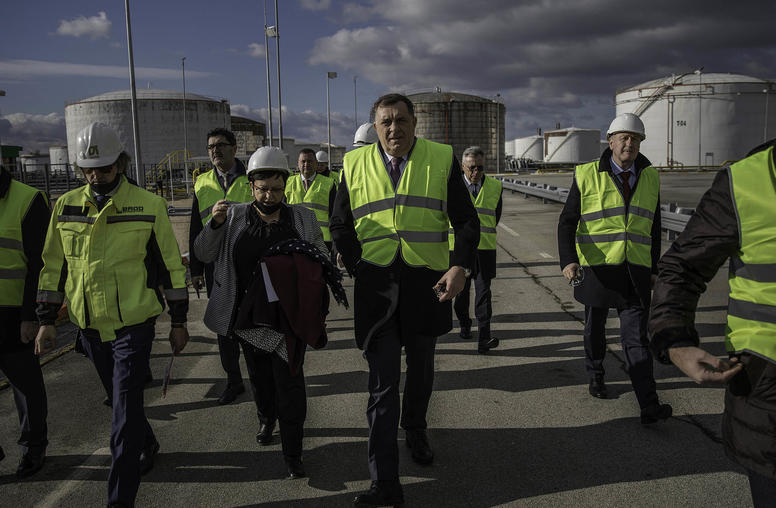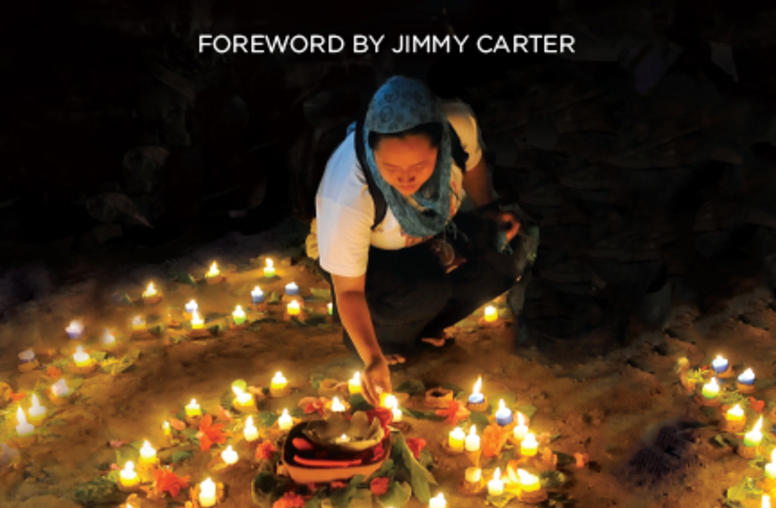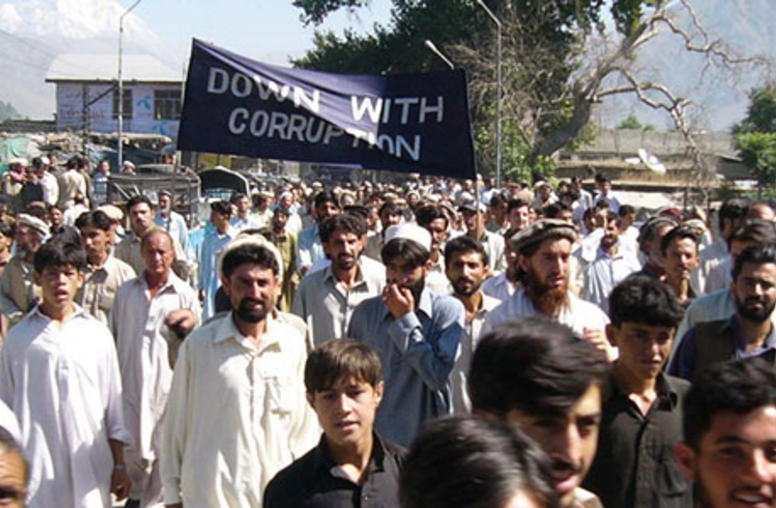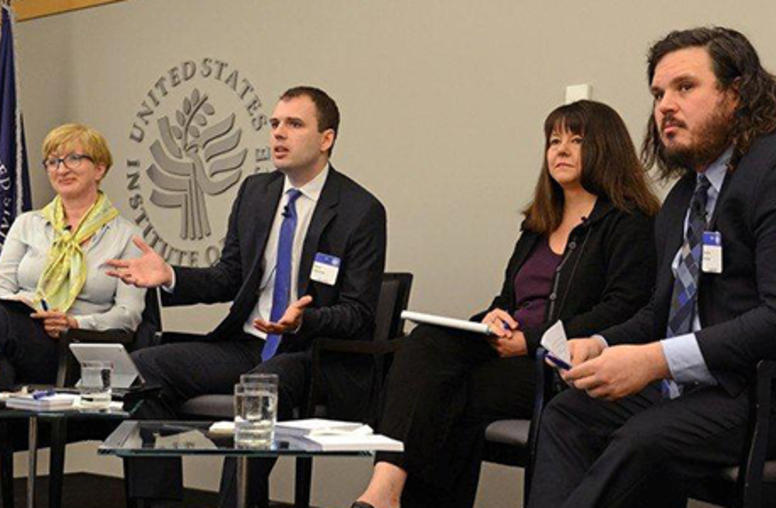The Dayton Legacy and the Future of Bosnia and the Western Balkans
Testimony before the House Foreign Affairs Subcommittee on Europe, Eurasia, and Emerging Threats
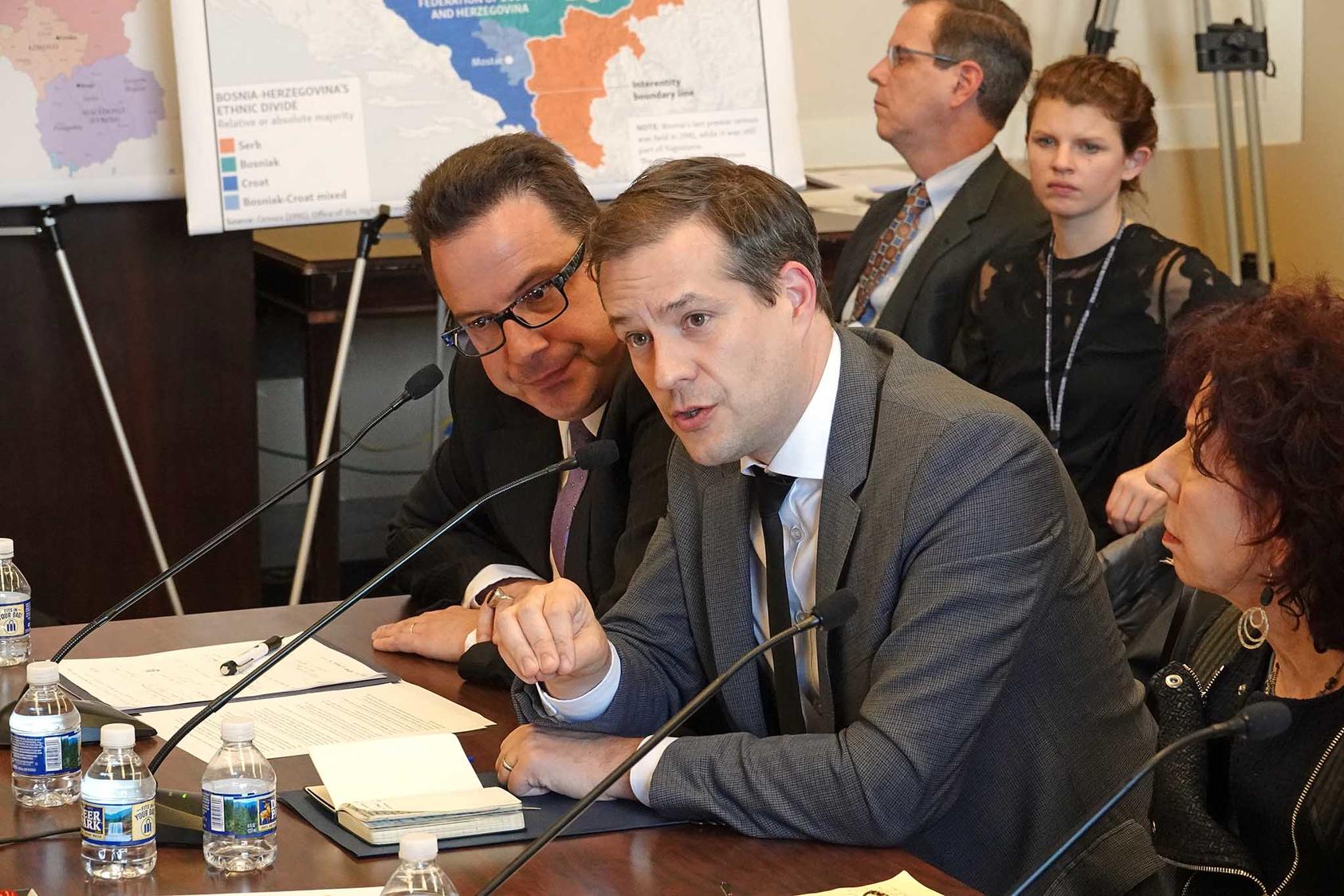
Subcommittee Chairman Rohrabacher, Ranking Member Meeks, and members of the Subcommittee, thank you for the opportunity to testify on the “Dayton Legacy and the Future of Bosnia and the Western Balkans.” Your attention to this issue is appreciated.
I testify before you today as the Director for Rule of Law, Justice and Security at the United States Institute of Peace, although the views expressed here are my own. USIP was established by Congress over 30 years ago as an independent, national institute to prevent and resolve violent conflicts abroad, in accordance with U.S. national interests and values.
I worked, earlier in my career, as the Head of the Public Law Unit of the Legal Department of the Office of the High Representative for Bosnia and Herzegovina (OHR) in Sarajevo. I also headed the Legal Department of the International Civilian Office (ICO) in Kosovo. My testimony is informed by this specific experience and perspective.
I have been asked by the Subcommittee to comment on the electoral impasse engendered by the decision of the Constitutional Court of Bosnia and Herzegovina to declare certain provisions of the current electoral law regulating the election of delegates to the Federation House of Peoples unconstitutional. My testimony will cover the following specific questions: (1) How Bosnia has arrived at the current electoral impasse? (2) What solutions have been put forward? and (3) What can we learn about the continued efficacy of the Dayton framework?
How Bosnia has Arrived at the Current Electoral Impasse?
Bosnia and Herzegovina is composed of a central state government (Bosnia and Herzegovina) and two Entities (the Federation of Bosnia and Herzegovina and the Republika Srpska). Its constitutional structure also includes the District of Brčko.
The Federation of Bosnia and Herzegovina, one of Bosnia and Herzegovina’s two Entities, is itself structured into a federal arrangement with a federal level of government and ten cantons. The federal level of government of the Federation of Bosnia and Herzegovina Entity includes an executive, legislative and judicial branch of government. The legislative branch is a bicameral body composed of a (1) House of Representatives and a (2) House of Peoples. The House of Peoples co-decides all legislation and protects the vital national interest of constituent peoples.
The current electoral impasse in Bosnia and Herzegovina concerns one of Bosnia’s two Entities – namely the Federation of Bosnia and Herzegovina. The impasse relates to legal provisions regulating the election of delegates to the House of Peoples of the Federation of Bosnia and Herzegovina.
The election of delegates to the Federation House of Peoples is regulated by two main legal sources:
- The Election Law of Bosnia and Herzegovina: a law from the central state government adopted by Bosnia and Herzegovina’s Parliamentary Assembly.
- The Constitution of the Federation of Bosnia and Herzegovina: Entity legislation providing for the organization of the Entity.
Elections are scheduled to take place across all levels of government in Bosnia and Herzegovina in October 2018.
The current impasse stems from decisions adopted by the Constitutional Court of Bosnia and Herzegovina in relation to the Election Law of Bosnia and Herzegovina. In December 2016, the Court declared that certain provisions of the Election Law of Bosnia and Herzegovina regulating the election of delegates to the House of Peoples of the Federation were unconstitutional (Ljubic case).
The Court requested the central state Parliamentary Assembly to amend the provisions of the Election Law of Bosnia and Herzegovina. The Parliamentary Assembly has, to date, failed to do so. The Court issued a non-enforcement ruling by which it repealed the disputed provisions of the Election Law of Bosnia and Herzegovina. This has led to a legal vacuum. This legal vacuum is at the center of the current electoral impasse.
Impacts of Legal Vacuum
The current legal vacuum has at least two major impacts:
- Potential paralysis of state and entity governments: The House of Peoples has, in addition to its legislative responsibilities, a role to play vis-à-vis the formation of the government and legislature of both the Entity and the central state. It must, for example, approve the President of the Federation and the cabinet of the Federation. It is also responsible to select delegates to the House of Peoples of the central Parliamentary Assembly. Its delegates can also block a decision of the Presidency of Bosnia and Herzegovina. Absent a solution to this legal vacuum, several components of Bosnia and Herzegovina’s governance structure could therefore be either paralyzed after October 2018.
- Political competition between political parties: the Ljubic decision reignited an intense competition between political parties in the Federation and has reopened the issue of the representation of Bosnian Croats in its governing structures.
Political Competition
Political camps in the Federation Entity are seeking to redesign electoral rules and constituencies in ways that would benefit them. This gerrymandering competition can be summarized as a competition between two broad options:
- High Constituency Concentration: The Croatian Democratic Union party of Bosnia and Herzegovina (HDZ BiH) dominates the Bosnian Croat political scene in the Federation Entity. Its proposals for new election rules have sought to limit the power to elect Croat delegates to the Federation House of Peoples to cantons where Bosnian Croats form a majority of the cantonal population. Such proposals have sought to significantly restrict – or exclude – the rights of Bosnian Croat delegates from cantons where Bosnian Croats are not in the majority of the cantonal population. HDZ BiH is opposed to electoral arrangements allowing, according to its perspective, an overrepresentation of Bosnian Croat delegates from cantons where they form a small fraction of the cantonal population.
The Bosnian Croats are in the majority in four of the ten cantons in the Federation Entity (Posavina Canton, Herzegovina-Neretva Canton, West Herzegovina Canton and Canton 10). All four cantons share a border with neighboring Croatia. - Low Constituency Concentration: On the other hand, Sarajevo based parties [Party for Democratic Action (SDA), Alliance for a Better Future (SBB), Social Democratic Party (SDP), Democratic Front (DF)] oppose the demands of the HDZ BiH. They claim that the HDZ proposals seek to disenfranchise Bosnian Croat voters living in cantons where they are not in the majority. Those parties largely advocate for maintaining the status-quo. Some of them also fear that concentrating voting power in cantons contiguous to neighboring Croatia represents the first step of a broader strategy to establish a new Croat majority federal unit that could, akin to Republika Srpska, threaten to declare independence.
Some of them insist on the capacity of all cantons to participate in the election of Croat delegates to the House of Peoples. Some of the Sarajevo based parties also insist on using the prewar census of 1991 to calculate the number of delegates for each canton. The 6 cantons where Bosnian Croats are currently not in the majority had larger Bosnian Croat populations before the war. Using the 1991 census as a basis to elect delegates gives them a greater say in the election of Bosnian Croat delegates to the House of Peoples.
The two camps have not yet agreed on a solution. Most political parties tend to rely on rigid maximalist positions. Given that elections are scheduled for October 2018, it is harder for parties to consider and consent to difficult compromises at this point.
What Solutions have been put forward?
Several political parties have proposed various amendments. The proposals have all failed as none sought a genuine compromise. Certain proposals have been mostly examined in discussions led by the European Union and the United States. The range of proposals can be grouped into two broad categories:
- Maximalist solutions: By maximalist solutions, I mean solutions designed to serve the exclusive interests of a given political party. Examples of maximalist solutions include those seeking to concentrate voting power into the four majority Bosnian Croat cantons, or solutions suggesting to transform the House of Peoples in the Federation into a body vested with less power.
- Compromise solutions: By compromise solutions, I mean solutions based on common ground that do not encroach upon core interests of a given political actor. Examples of compromise solutions include those seeking to add delegates to the House of Peoples to address claims of overrepresentation or proposals to qualify the capacity of cantons with small Bosnian Croat population to elect Croat delegates.
The international community should remain flexible vis-à-vis a potential solution. An agreement on a solution should meet the following principles:
- The solution should comply with the constitutional framework of Bosnia and Herzegovina.
- It should enjoy the political support necessary to ensure passage before the relevant legislatures.
- It should not further undermine Bosnia and Herzegovina’s capacity to ensure that its electoral system complies with the European Court for Human Rights.
- It should ensure that the right to vote and to be candidate for a seat in the Federation House of Peoples is guaranteed for all cantonal delegates belonging to a constituent people.
- It should not further undermine Bosnia and Herzegovina’s governance structure.
Failure to reach agreement
Should the parties fail to reach agreement before the October elections, additional avenues could be considered to enact a solution.
Some have argued that the Election Commission of Bosnia and Herzegovina could step in. The Commission is mandated by law to determine, for the upcoming elections, new numbers of delegates for the Federation House of Peoples on the basis of the 2013 census. While the Commission could play a role in solving the impasse, there are significant risks attached to this solution. The legal basis for the Commission to impose a comprehensive compromise in line with Bosnia’s constitutional framework is fragile. A solution imposed by the Election Commission is likely to face new legal challenges. It would also politicize a critical domestic institution.
Some have also suggested that the High Representative for Bosnia and Herzegovina enact a solution on the basis of his powers under the Dayton peace agreement and relevant resolutions of the United Nations Security Council. There are risks attached to this course of action as well. Parties will likely challenge the legality of the measure enacted. It will also send a signal to the European Union that Bosnia’s representatives are unable to organize their own elections.
This may be, nevertheless, the best course of action. It will prevent a dangerous politicization of the Election Commission. The potential impact on Bosnia’s EU membership aspirations must be measured against the fact that Bosnia and Herzegovina is not yet a candidate country and that, according to the European Commission’s newly released strategy for the Western Balkans, its membership perspectives would materialize only after 2025.
Any solution enacted by the High Representative would need to meet the principles suggested above for a negotiated solution. It should also be made clear that the solution would be effective until parties enact a permanent solution. It should also be strongly supported by the members of the Peace Implementation Council, including the United States and the European Union.
What can be learned about the efficacy of the Dayton Framework?
The current electoral impasse illustrates some of the dysfunctionalities generated by the particularly complex constitutional architecture agreed upon at Dayton. While most democracies must contend with intense political competition and temporary dysfunctions, Bosnia and Herzegovina is different.
Its difference lies in the fact that while political parties fight over resources, economic growth, and electoral tactics just like in any other country, some parties also use political, administrative and legal means to pursue wartime objectives that directly challenge the very foundation of the democratic space established by the Dayton agreement.
Calls by ultranationalist factions for Republika Srspka to secede from Bosnia as well as calls for majority Bosnian Croat cantons to control the Federation and the central level of government through a constellation of constitutional and electoral guarantees are highly destabilizing for Bosnia and Herzegovina.
The Dayton agreement has been criticized since its entry into force. Such criticisms must be measured against the fact that the Dayton agreement is a peace agreement that was supported by the United States, the European Union and Russia to stop a brutal war in a country inhabited by a majority Muslim population. It imposes obligations upon Serbia and Croatia to respect the sovereignty and territorial integrity of Bosnia – a country they actively sought to annex just two decades ago. The agreement allowed for peace and stability to return to Bosnia. It reestablished freedom of movement throughout the country. It allowed more than 1 million persons who had been displaced by the war to exercise their right to return under the peace agreement. The World Bank expects Bosnia’s GDP to grow at a rate of 3.2% in 2018. Although progressing slowly and painfully, Bosnia is nevertheless progressing toward EU and NATO membership.
If we compare the Dayton agreement to other peace processes, there is little doubt that Dayton is a success.
Calls for a comprehensive overhaul of Dayton have become common through the years. While pointing to serious problems in the design of Dayton, such calls must be measured against difficult realities:
- Any change to the Constitution established at Dayton needs to meet the requirements of the amendment procedure set by the Constitution. These changes must be supported by a wide spectrum of interests. If parties find it difficult to agree to legal provisions governing the election of delegates to the House of Peoples of the Federation Entity, they are likely, at the very least, to face similar difficulties while assessing a comprehensive overhaul of the Dayton constitutional framework.
- There is currently no defined alternative constitutional structure that would be supported by all parties.
- The incentives for change are currently weak. The prospect of EU membership has been, on its own, unable to bring parties to agree to significant reforms over the last decade.
As other regional powers are exercising increasing levels of influence in the region, there is still a chance for the EU and the United States to unite forces to help Bosnia and Herzegovina address some of the more problematic aspects of the Dayton constitutional structure. A common strategy would need to achieve the following:
Clear objectives: Key EU and NATO members states should clearly define that only a united Bosnia will be eligible to enter into the EU and NATO. Moreover, in order to meet the obligations of EU membership, Bosnia and Herzegovina should have an efficient state level government which, in addition to its current responsibilities, will be vested with additional responsibilities necessary to effectively and efficiently implement the European acquis communautaire.
Neighboring countries: Serbia’s access to Euro Atlantic organizations must be contingent upon it playing a positive role in Bosnia. Croatia’s standing and influence within the European Union and NATO must be contingent upon the same.
Reform by incremental agreements: Reforming Dayton is possible through incremental agreements. In the past, assertive international support has led to agreements to amend the Constitution to recognize the existence of Brčko District. International involvement has also led to agreements between the Entities to transfer responsibilities to the central state in the field of defense, taxation or justice. These agreements must include groups of Bosnian citizens that do not belong to the current political parties.
Maintaining stability: The EU and the United States must prevent a return to instability. They can do so by continuing to support the mandates of the High Representative and the international military presences in Bosnia. The EU integration process has proven to be destabilizing for Bosnia and Herzegovina. The accession process demands significant changes in the current allocation of power in a country that is particularly sensitive to such demands. International mandates to maintain stability in Bosnia are an essential insurance policy to accompany Bosnia until it secures its place firmly in Europe and NATO. The current international military presences should also be encouraged to base some of their operations in the Brčko District to contain the secessionist aspirations of Republika Srpska president Milorad Dodik.
Recommendations
To address current electoral impasse:
- Support the joint EU and United States efforts to facilitate a political settlement.
- Call upon the governments of Serbia and Croatia to actively support a solution in Bosnia and Herzegovina.
- Encourage active U.S. diplomatic and congressional pressure to the heads of the political parties in Bosnia and Herzegovina by expressing support for an agreement based on the following principles:
- The solution should comply with the constitutional framework of Bosnia and Herzegovina.
- It should enjoy the political support necessary to ensure passage before the relevant legislatures.
- It should not further undermine Bosnia and Herzegovina’s capacity to ensure that its electoral system complies with the European Court for Human Rights.
- It should ensure that the right to vote and to be candidate for a seat in the Federation House of Peoples is guaranteed for all cantonal delegates belonging to a constituent people.
- It should not further undermine Bosnia and Herzegovina’s governance structure.
- Support the enactment of a solution by the High Representative should the parties fail to reach agreement on time.
To address concerns about the efficacy of the Dayton agreement:
- Invite the U.S. government to design and implement a common strategy with key members of the European Union and NATO member states.
- Invite the U.S. government and key EU member states to set the conditions under which Bosnia and Herzegovina will be allowed to join NATO and the EU.
- Support the establishment of an incremental constitutional reform process shepherded by the EU and the United States.
- Invite authorities responsible to manage the international military presences in Bosnia and Herzegovina to base some of their operations in Brčko District.
- Continue to support the authorities of the High Representative until Bosnia and Herzegovina has secured its membership in the European Union and NATO.
Thank you for your continued focus and attention to this critical issue. I look forward to answering your questions.
